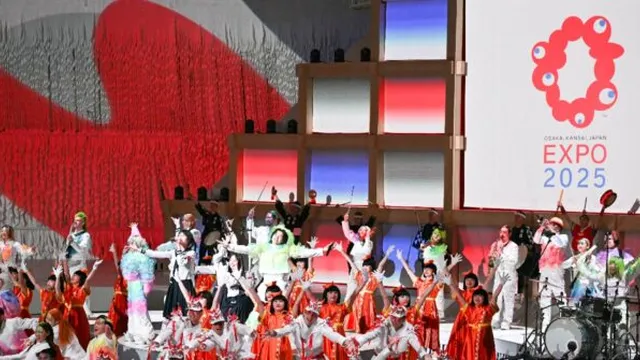
Shigeru Ishiba hopes Osaka expo will heal global divisions
2025-04-12 13:10- Japan's Expo 2025 opening ceremony highlighted the need for global unity amid rising tensions.
- Over 160 countries are participating, showcasing advancements in technology and culture.
- Japanese Prime Minister Shigeru Ishiba expressed hope that the expo will facilitate discussions and connections between nations.
Express your sentiment!
Insights
Japan is hosting Expo 2025 in Osaka, a significant event aimed at improving global unity. The opening ceremony took place on Saturday, April 12, 2025, and was attended by Japanese Prime Minister Shigeru Ishiba, who emphasized the importance of gathering during such divided times. The Expo features over 160 countries showcasing advances in technology and culture, with the overarching theme focused on life and the future. The venue, located on Yumeshima island, includes a beautifully designed Grand Ring, representing unity among nations. The event, amidst a backdrop of global tensions from trade conflicts and the ongoing war in Ukraine, stands as a symbol of hope for a more unified world. Japan last hosted a World Expo in 1970, which attracted 64 million visitors, a record at the time. Now, however, public interest is notably lower, with ticket sales not meeting expectations as preparations faced delays due to rising costs and geopolitical tensions. The Expo represents a culmination of efforts to provide a platform for discussions on vital global issues, including the aftermath of the coronavirus pandemic that affected countries worldwide. Ishiba expressed hopes that through this gathering, interactions will foster connections that transcend national boundaries and promote peace and understanding. Despite criticisms regarding the event's financial implications and environmental concerns, with many pavilions set to be dismantled after the Expo, Japan has mobilized significant resources to ensure the event's success. Over time, the complexities surrounding the reception of the Expo have grown, driven by external economic pressures and fluctuations in tourism. Furthermore, the presence of advanced technologies, coupled with a display of Japan's rich cultural heritage, serves to enhance the Expo's goals of bridging gaps between nations and promoting a sustainable future. The six-month event is expected to draw vast crowds, uniting diverse individuals in a shared exploration of progress and harmony. While the Expo aims to showcase cutting-edge innovations and inspire collaboration, the journey to its realization has not been without challenges. The financial burden on the government and the delayed readiness of some international pavilions illustrate the complexities of organizing such a grand event amidst widespread economic shifts and conflicts. Now, as the Expo opens its doors to the public, there is a collective hope that it can act as a catalyst for global dialogue and understanding, promoting visions of a united future. Ishiba's address at the ceremony encapsulates this spirit of optimism, urging the international community to come together amid disarray and work toward a better tomorrow.
Contexts
World Expositions, or Expos, have served as a significant platform for showcasing innovation, culture, and national identity since their inception in the mid-19th century. These grand events provide an opportunity for countries to present their achievements and aspirations in a unified space. The impact of these gatherings on global unity is profound, as they foster diplomatic relations, cultural exchange, and international collaboration. Expos bring together diverse nations, allowing them to share their visions for the future while recognizing common goals and challenges that transcend borders. Throughout history, Expos have tackled pressing global issues, from industrial advancements to social and environmental challenges. For instance, the 1851 Great Exhibition in London not only celebrated the industrial revolution but also set a precedent for international cooperation. Since then, subsequent Expos have mirrored the zeitgeist of their times, addressing issues such as sustainability, technological innovation, and global health. The collaborative atmosphere during these events promotes mutual understanding, encouraging nations to view themselves as part of a global community rather than isolated entities. Moreover, participation in World Expos encourages countries to engage with each other through shared experiences and the exploration of various cultures. This engagement can take many forms, including cultural performances, exhibitions, and dialogues that showcase a country’s heritage, art, and scientific achievements. Such interactions, through creativity and cultural diplomacy, have the potential to break down stereotypes and build friendships between nations. The essence of Expos lies in the idea that despite differences in language, customs, and ideologies, there is a powerful thread of common humanity that unites people around the globe. In contemporary times, Expos continue to play a crucial role in advocating for global issues, instilling hope for a more unified future. As nations grapple with challenges like climate change, health crises, and socio-economic inequalities, the partnership fostered through these exhibitions can lead to impactful solutions. By showcasing innovations and fostering dialogue, Expos can strengthen international alliances and encourage collaborative efforts towards a better world. Ultimately, the legacy of World Expos lies in their enduring capacity to promote global unity, reminding us of our collective responsibility to build a harmonious and sustainable future.